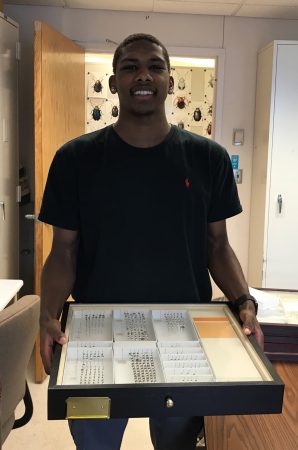A bugs life: Brian Smith ’20 works on beetle exhibits at Smithsonian Museum of Natural History

Brian Smith holds a case of beetle and weevil specimens as part of his internship at the Smithsonian Museum of Natural History
This summer, biology major Brian Smith ’20 is working with some of the smallest specimens at one of the largest museums in the nation.
Smith is an insect specimen curator at the Smithsonian Museum of Natural History in Washington, D.C. As part of the internship, he sorts, mounts, and images beetles and weevils in a variety of sizes. He and another intern are also working on the Malagasy Project, which contains specimens from Madagascar—some of which he had never heard of before.
“I wanted to gain valuable experience working with a museum’s collection and their specimens,” Smith said. “I also wanted to do this to prepare for future job opportunities, and working for a prestigious institution like the Smithsonian will look great on my resume.”
This isn’t the first nationally recognized organization Smith has interned for during his time at Randolph. Last summer, he worked as a mammal keeper at the Jacksonville Zoo & Gardens in Jacksonville, Florida.
“I’m not sure what my future plans after Randolph are,” Smith said. “I’m not interested in working with insects long term, but working in specimen curation with mammals or reptiles could be interesting. I also loved working with live animals when I was at the zoo last year.”
In addition to giving him the skills to succeed, Smith has also been financially supported by the College in this venture. This summer, he received a grant from the Helen S. and Charles G. Patterson Foundation. The grant allows students to apply for up to $5,000 to cover housing, transportation, food, and other costs associated with their internships in museum work, natural history, or other related fields. For Smith, the funds have helped cover transportation into Washington, D.C.
Tags: biology, Brian Smith, grants, Helen S. and Charles G. Patterson Foundation, internships, natural history, Smithsonian Museum of Natural History, summer 2019 internships
